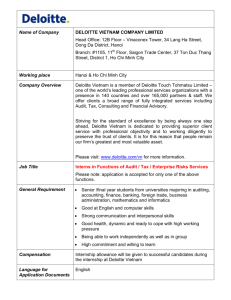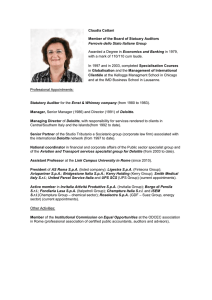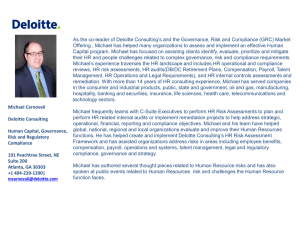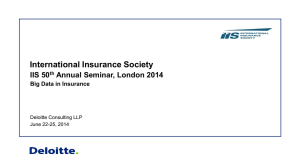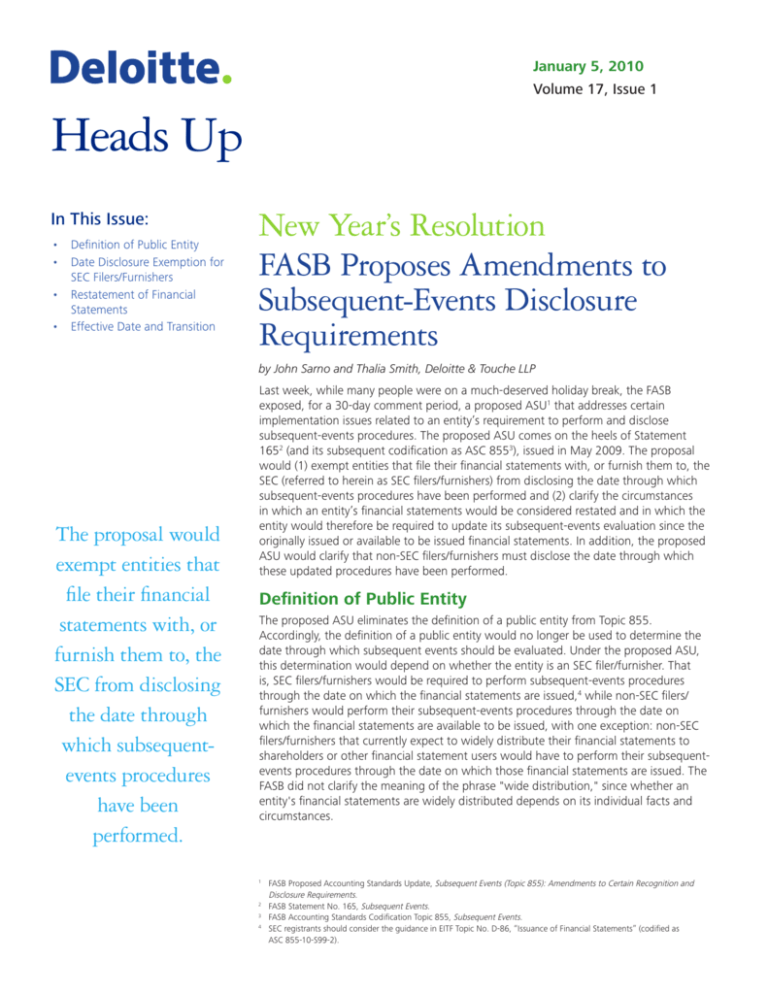
January 5, 2010
Volume 17, Issue 1
Heads Up
In This Issue:
• Definition of Public Entity
• Date Disclosure Exemption for
SEC Filers/Furnishers
• Restatement of Financial
Statements
• Effective Date and Transition
New Year’s Resolution
FASB Proposes Amendments to
Subsequent-Events Disclosure
Requirements
by John Sarno and Thalia Smith, Deloitte & Touche LLP
The proposal would
exempt entities that
file their financial
statements with, or
furnish them to, the
SEC from disclosing
the date through
which subsequentevents procedures
have been
performed.
Last week, while many people were on a much-deserved holiday break, the FASB
exposed, for a 30-day comment period, a proposed ASU1 that addresses certain
implementation issues related to an entity’s requirement to perform and disclose
subsequent-events procedures. The proposed ASU comes on the heels of Statement
1652 (and its subsequent codification as ASC 8553), issued in May 2009. The proposal
would (1) exempt entities that file their financial statements with, or furnish them to, the
SEC (referred to herein as SEC filers/furnishers) from disclosing the date through which
subsequent-events procedures have been performed and (2) clarify the circumstances
in which an entity’s financial statements would be considered restated and in which the
entity would therefore be required to update its subsequent-events evaluation since the
originally issued or available to be issued financial statements. In addition, the proposed
ASU would clarify that non-SEC filers/furnishers must disclose the date through which
these updated procedures have been performed.
Definition of Public Entity
The proposed ASU eliminates the definition of a public entity from Topic 855.
Accordingly, the definition of a public entity would no longer be used to determine the
date through which subsequent events should be evaluated. Under the proposed ASU,
this determination would depend on whether the entity is an SEC filer/furnisher. That
is, SEC filers/furnishers would be required to perform subsequent-events procedures
through the date on which the financial statements are issued,4 while non-SEC filers/
furnishers would perform their subsequent-events procedures through the date on
which the financial statements are available to be issued, with one exception: non-SEC
filers/furnishers that currently expect to widely distribute their financial statements to
shareholders or other financial statement users would have to perform their subsequentevents procedures through the date on which those financial statements are issued. The
FASB did not clarify the meaning of the phrase "wide distribution," since whether an
entity's financial statements are widely distributed depends on its individual facts and
circumstances.
FASB Proposed Accounting Standards Update, Subsequent Events (Topic 855): Amendments to Certain Recognition and
Disclosure Requirements.
2
FASB Statement No. 165, Subsequent Events.
3
FASB Accounting Standards Codification Topic 855, Subsequent Events.
4
SEC registrants should consider the guidance in EITF Topic No. D-86, “Issuance of Financial Statements” (codified as
ASC 855-10-S99-2).
1
Date Disclosure Exemption for SEC Filers/Furnishers
The proposed ASU amends ASC 855-10-50-1 and 50-4 to clarify that an entity must
disclose the date through which subsequent events have been evaluated in both
originally issued and restated financial statements, unless the entity is an SEC filer/
furnisher. In other words, an SEC filer/furnisher is not required to disclose the date
through which subsequent events have been evaluated in its originally issued or restated
financial statements. The FASB reasoned that because “the SEC has specific requirements
related to the identification and disclosure of subsequent events [and] SEC requirements
are clear on registrants’ responsibilities for evaluating subsequent events,” U.S. GAAP
should not require entities subject to these requirements to provide a date disclosure in
their financial statements. However, as noted above, the proposed ASU would continue
to require an SEC filer/furnisher to evaluate subsequent events through the date on which
financial statements are issued.
Editor’s Note: An entity that is not an SEC filer/furnisher must still disclose in its
financial statements the date through which subsequent-events procedures were
performed and whether this date was the date of issuance or the date on which
financial statements were available to be issued.
Restatement of Financial Statements
The FASB staff has
indicated that it will
attempt to finalize
the guidance for this
calendar-year-end
reporting season.
The proposed ASU further amends ASC 855-10-50-4 to clarify that financial statements
are considered restated when originally issued financial statements are revised (1) for the
correction of an error or (2) to retrospectively apply an accounting standard. Accordingly,
an entity would have to update its subsequent-events procedures through the date of
restatement of the financial statements. In addition, non-SEC filers/furnishers would have
to update the disclosed date through which the subsequent-events procedures have been
performed in their restated financial statements.
Editor’s Note: The definition of “restatement” in the proposed ASU is different from
that in ASC 2505 (formerly Statement 1546). The definition in ASC 250-10-20 is limited
to the correction of an error in previously issued financial statements.
Effective Date and Transition
The final ASU would be effective immediately upon issuance. Comments on the proposed
ASU are due by January 28, 2010. The FASB staff has indicated that it will attempt to
finalize the guidance for this calendar-year-end reporting season (i.e., in time for entities
to take the new guidance into account when preparing their financial statements for
the year ended December 31, 2009). However, because of the 30-day comment period
and the time the Board needs to deliberate any comments received, the FASB may find
it challenging to issue a final ASU before calendar-year-end SEC filers/furnishers must file
their financial statements with the SEC.
Accounting Standards Codification Topic 250, Accounting Changes and Error Corrections.
FASB Statement No. 154, Accounting Changes and Error Corrections — a replacement of APB Opinion No. 20 and FASB
Statement No. 3.
5
6
2
Subscriptions
If you wish to receive Heads Up and other accounting publications issued by Deloitte’s Accounting Standards and
Communications Group, please register at www.deloitte.com/us/subscriptions.
Dbriefs for Financial Executives
We invite you to participate in Dbriefs, Deloitte’s webcast series that delivers practical strategies you need to stay on top of
important issues. Gain access to valuable ideas and critical information from webcasts in the "Financial Executives" series on
the following topics:
• Corporate governance.
• FAS 109. • Private companies.
• Driving enterprise value.
• Financial reporting.
• Risk intelligence.
• Transactions and business events.
Dbriefs also provides a convenient and flexible way to earn CPE credit — right at your desk. Join Dbriefs to receive
notifications about future webcasts at www.deloitte.com/us/dbriefs.
Registration is available for this upcoming 90-minute Dbriefs webcast:
• Year-End Reporting Issues: An Update on Current Issues and Items on the Horizon (January 13).
Use the link above to register. The webcast begins at 2 p.m. (EST).
Technical Library: The Deloitte Accounting Research Tool
Deloitte makes available, on a subscription basis, access to its online library of accounting and financial disclosure literature.
Called Technical Library: The Deloitte Accounting Research Tool, the library includes material from the FASB, the EITF, the
AICPA, the PCAOB, the IASB, and the SEC, in addition to Deloitte’s own accounting and SEC manuals and other interpretive
accounting and SEC guidance.
Updated every business day, Technical Library has an intuitive design and navigation system that, together with its powerful
search features, enable users to quickly locate information anytime, from any computer. In addition, Technical Library
subscribers receive Technically Speaking, the weekly publication that highlights recent additions to the library.
For more information, including subscription details and an online demonstration, visit www.deloitte.com/us/techlibrary.
Heads Up is prepared by the National Office Accounting Standards and Communications Group of Deloitte
as developments warrant. This publication contains general information only and Deloitte is not, by means of
this publication, rendering accounting, business, financial, investment, legal, tax, or other professional advice
or services. This publication is not a substitute for such professional advice or services, nor should it be used
as a basis for any decision or action that may affect your business. Before making any decision or taking any
action that may affect your business, you should consult a qualified professional advisor.
Deloitte shall not be responsible for any loss sustained by any person who relies on this publication.
As used in this document, “Deloitte” means Deloitte & Touche LLP, a subsidiary of Deloitte LLP. Please see
www.deloitte.com/us/about for a detailed description of the legal structure of Deloitte LLP and its subsidiaries.
Copyright © 2010 Deloitte Development LLC. All rights reserved.


